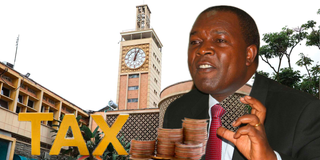How Mauritius fiasco has changed Kenya’s rules on double taxation treaties

Kenya intends to modify its Double Taxation Agreements with Canada, Denmark, France, India, Italy, Norway, Qatar, South Africa, Sweden, the United Kingdom, Seychelles, and the United Arab Emirates
In June 2020, then Cabinet Secretary for the National Treasury Ukur Yatani published a Legal Notice No.14 of 2020 declaring a Double Taxation Agreement (DTA) between Kenya and Mauritius to eliminate double taxation on income and prevent tax evasion or avoidance.
The notice was submitted to the Clerk of the National Assembly on July 6, 2020, and tabled before the House on July 15, 2020, and subsequently referred to the parliamentary departmental committee on Finance and National Planning for consideration.
The committee requested comments from members of the public as per the constitutional requirement on public participation in such legislative processes.
A problem, however, sprung up. The Parliamentary committee soon discovered that it could not make any amendments to the Kenya-Mauritius DTA because it was submitted under the Statutory Instruments Act, 2013.
This meant that Kenya could not unilaterally make any changes to the signed DTA at this stage.
DTAs are negotiated through lengthy processes and guided by standard texts under the UN and the Organisation for Economic Cooperation and Development (OECD) DTA models as well as DTA models and follow a win-win or give-and-take approach based on the interests of the negotiating countries.
“Considering this unique nature of DTAs, subjecting them to public participation by Parliament after negotiations have been finalised poses a risk as it could lead to reopening already concluded agreements” Treasury Secretary Njuguna Ndung’u observes.
Finance Act
Helpless about the Kenya-Mauritius DTA, the Finance and National Planning Committee recommended changes to the law so that future DTAs are considered under the Treaty Making and Ratification Act, 2012.
Subsequently, the Finance Act, of 2021 made amendments to Section 41 of the Income Tax Act, cap 470 so that DTAs are subjected to the provisions of the Treaty Making and Ratification Act, 2021, and not the Statutory Instruments Act,2013.
In light of this, the National Treasury then convened a meeting of the DTA negotiation committee, which comprises the National Treasury, Office of the Attorney-General, Ministry of Foreign Affairs, and the Kenya Revenue Authority (KRA) to deliberate the DTA ratification process and propose the way forward.
In its deliberations, the team noted that due to the unique nature of DTAs, public participation ought to be concluded before the agreement is laid before Parliament for ratification.
Spooked by the fiasco on the Mauritius DTA, the National Treasury has now shaken up the rules on DTA and outlined a five-step process to maximise public participation in future deals.
Prof Ndung’u in an April 3, 2023 letter to the Clerk of the National Assembly Samuel Njoroge said the National Treasury will in the future subject draft DTA to public participation as a first step after the first round of negotiations between Kenya and a given treaty party.
“The draft DTA after incorporation of the public comments will be submitted to the National Assembly for pre-publication scrutiny. The changes proposed by the Parliamentary committee will be considered by the DTA negotiating committee in the second or any subsequent rounds of negotiations with the given treaty partner” he said in the letter copied Attorney-General Justin Muturi, Foreign and Diaspora Affairs Cabinet Secretary Alfred Mutua, and acting KRA Commissioner General Rispah Simiyu.
Ratification
The Treasury says that once the negotiations are concluded, the DTA will be signed by the competent authorities of the contracting states before the commencement of the ratification process, which will start with submitting the DTA to the Cabinet for consideration.
“Upon approval by the Cabinet, the DTA will be gazetted by the Attorney General and then submitted to the National Assembly for consideration. Approval of the National Assembly will complete the internal procedure of ratification for ratification of the DTA,” Prof Ndung’u added.
The proposed new rules on DTA deals by the National Treasury add to regulations approved by the Cabinet last month on tax treaties.
The Cabinet on March 21, 2023, approved Kenya’s proposed ratification of the Multilateral Convention to Implement Tax Treaty Related Measures to Prevent Base Erosion and Profit Shifting (commonly referred to as the MLI). This came nearly three years after Kenya became a signatory of the MLI on November 2019.
Launched in 2013, the MLI is a product of the OECD, which is purposed to amend double tax treaties (DTTs) to include among others anti-avoidance measures in DTTs entered into between countries.
Some of the key changes the MLI will make include the inclusion of limitation of benefits clauses in treaties and amendments to the definition of permanent establishment to address concerns on base erosion and profit shifting.
“The MLI is important for any person relying on DTTs since the treaty could be affected by the MLI. One key area that could affect many persons relying on DTTs is the introduction of anti-treaty shopping provisions such as the limitation of benefits clause in tax treaties,” Bernard Kirii, Andrew Oduor, Samuel Githanda, and Alex Mathini associates at law firm Bowmans said in a brief.
“A limitation of benefits clause is designed to limit the availability of treaty benefits to certain taxpayers based on certain objective criteria. Such a clause could prevent certain persons who could previously rely on the treaty from enjoying treaty benefits if they are not deemed qualifying taxpayers under the modified treaty,” they added.
Amending DDTs
In addition, the MLI seeks to solve the practical challenges that arise when amending DDTs.
Analysts said the MLI does not function in the same way as an amending protocol to a bilateral tax treaty, where such a protocol would directly amend the text of the specific treaty.
“Instead, the MLI applies alongside existing treaties and modifies their application in order to implement the BEPS measures. However, the amendments will only have the effect of amending the tax treaty where both treaty partners have elected for the same amendments to apply,” the associates at Bowmans said.
Once a country has signed and ratified the MLI, it will apply to all its existing tax treaties that are covered by such MLI, unless the country has made a reservation or notified a position of non-adoption concerning a specific provision or set of provisions.
Under the MLI, each contracting state will need to submit a list of its tax treaties that it wants to be covered by the MLI. The MLI will modify the existing double tax treaties by adding provisions to implement BEPS measures agreed upon in the BEPS project.
Kenya intends to modify its DTTs with Canada, Denmark, France, India, Italy, Norway, Qatar, South Africa, Sweden, the United Kingdom, Seychelles, and the United Arab Emirates. The DTTs that Kenya has entered into with Mauritius and Netherlands have been included in the list.





